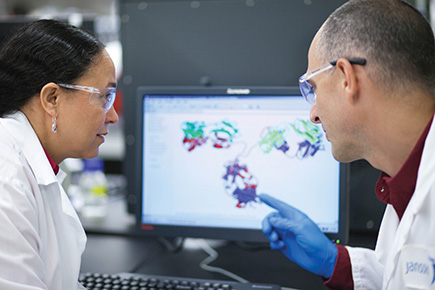Androgen Receptor (AR)
The androgen receptor (AR) plays an important role in the normal development and maintenance of the prostate. However, multiple changes occur in the AR-axis across disease stages, including the generation of AR splice variants, which allow continual androgen signaling to occur. Several changes have been identified, including AR splice variants. Janssen biomarker scientists have developed tests to detect the presence of these AR abnormalities. Efforts are also ongoing to understand the “AR-axis” in CTCs. AR-axis tests are designed to detect multiple biomarker changes at the same time.
Fibroblast Growth Factor Receptor (FGFR)
FGFRs are tyrosine kinase receptors involved in signal transduction. Deregulation of the pathway controlled by these receptors normally leads to cancer. In collaboration with Astex, Janssen has identified a small molecule inhibitor that has activity against the four receptors in this family. We have identified biomarkers that enable our clinical team to design studies that select for patients who we believe will be more responsive to the drug.
Bruton’s Tyrosine Kinase (BTK)
Studies suggest that normal B-cells, and potentially their malignant counterparts, require B-cell receptor signaling through BTK for maturation and survival. Our current biomarker activities are focused on characterizing molecular and genetic mechanisms of tumor cells that lead to drug resistance, and identification of biomarkers associated with B-cell receptor pathway addiction (i.e., drug sensitivity).




